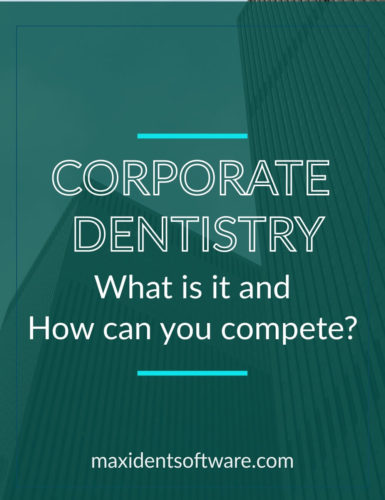
How often do you think about corporate dentistry? Do you hear about it on the news? Is it currently affecting your independent practice? If you are either fighting to compete against corporate dentistry or sitting on the decision to work with one of them, this article will help you better understand what corporate dentistry is, what these organizations might be missing, the other side of corporate dentistry, and if and even how independent practices who want to keep fighting are able to compete successfully.
A few weekends ago, I watched a segment on Last Week Tonight with John Oliver, detailing the effects of corporate consolidation on small businesses, and it got me thinking about corporate dentistry. If you are not aware of what corporate consolidation is, it is defined as the merger and acquisition of many smaller companies into much larger ones (eg. the Bell MTS merger). Corporate dentistry is similar in two significant ways: it is a corporation swallowing up smaller businesses and it too has a negative impact on the quality of customer care. This brings us to our first question:
What is corporate dentistry?
Corporate dentistry is the merger of small practices within a larger entity. Not all corporate dentistry is the same, though. Corporate dentistry can also mean multi-location practice owned by one or two doctors. To narrow it down, we are going to focus on one type of corporate dentistry called DSOs or DSMOs. These Dental Service Organizations are owned and operated, not by doctors, but by either an investor or other third-party. These organizations control “all business and management of the practice, including hiring and training employees and associates, procuring equipment, marketing and promotion, and setting fees for service.” As an example, here in Canada, the biggest DSO is DCC or the Dental Corporation of Canada “which runs more than 160 practices across the country, including up to 30 in B.C.”
What are DSOs missing?
The answer to this question is crucial to those independent practices attempting to successfully compete with DSOs. Chambers, a dentist who received a hand-delivered letter from a representative of the DCC, regarding “future opportunities” for his practice had this to say to the Vancouver Sun about what he implies might, in fact, be missing from corporate dentistry:
“I think that dentistry is about more than just looking at people’s teeth and putting fillings in. You develop relationships with people.” He went on to add that “It seems that when these corporations take over, the dentist is no more than a cog in the machine.”
Is it possible that what corporate dentistry is missing is the concept of developing personal relationships? According to Chambers, that is absolutely the case. In fact, in the same article, Nadean Burkett, a dental management specialist and advocate working to combat the corporate influence on dentistry in Canada, says this about the corporate takeover: “Everything that is happening will have some kind of effect on the quality of patient care, access to patient care, and the patient’s right to choose.” Even the author of the Vancouver Sun article weighed in, writing that operations like the DCC are “basically the Walmarts of the dentistry world.”
Of course, in the style of John Oliver’s Last Week Tonight segments, we have to be fair and examine the other side of DSOs. Many have given these organizations a good name as they do offer dentists and patients substantial benefits for signing on. What kind of benefits, you ask?
According to a popular article entitled, Corporate Dentistry vs Private Practice – Secrets Uncovered, dentists who decide to work with a DSO/DSMO are provided the following:
- Part-time, high income; the ability to work fewer hours and yet still maintain a high income.
- The opportunity to remove oneself from the difficult and stressful task of hiring and firing
- Options to move.
- Concerns with accounts receivable is no longer an issue as the dentist will not have the responsibility of collections.
- No longer tasked with practice strategy. Dentists can just come in and “do dentistry.”
- No more patient scheduling or staff training responsibilities.
- Administrative and marketing support
Additionally, those benefits also extend to the patients, with . . .
- Promise of low fees
- Flexible financing
- Convenient hours
On the other hand, there seems to be a lack of transparency with these organizations. For example, DCC “doesn’t list any of its locations on its website, and none of its practices display their affiliation in their offices or online,” Burkett says. This lack of transparency is disturbing to Burkett who says “from the perspective of the public — to me — this is a huge problem, because I want to know who is controlling my oral care.” As I’m sure all patients would feel the same. I certainly do.
This is just one of the reasons independent doctor-owned practices are so essential, but if you’re a small fish in a corporate pool, how do you compete? This brings us to our final question:
How do you, as an independent practice, compete with DSOs/DSMOs? Or more importantly, can you compete?
This is where you as an independent practice can focus on what these organizations are missing, such as the ability to develop long-lasting relationships with patients. It has even been pointed out by Leon Klempner, DDS, that you should take advantage of their lack of quality of patient care. Gain and develop trusting relationships with your existing clients and utilize “that trust to retain your current patients, as well as attract new ones.”
In Klempner’s article entitled, “Want to Compete with Big Business? Tap Into Your Relationships” he suggests that “The bottom line is that DSOs are effectively commoditizing dental-care services, and working to ensure that the patient’s decision is about price and convenience, and not quality.”
What does he suggest to compete with DSO’s? His game plan is to focus on three factors: reputation management, social media marketing, and digital advertising. Now, let’s take a look at each of these more closely:
Reputation Management
Your online reputation is what is being shared and said about you and your practice through online reviews, positive and negative. Managing this online reputation will require you to request from your loyal patients’ positive reviews by providing them a form on your website, a comment card in your office, or through certain review sites, such as Yelp. Never think you will not receive negative reviews, but understand what you can do about them. Do not delete, instead, provide a powerful response that will be informative without sounding offensive or defensive.
Managing your online reputation in this way “highlights the trust your patients have in you, which goes a long way to differentiate your practice from DSOs.”
Social Media Marketing
Social media is instrumental in how prospective patients evaluate you. But it also allows you to connect with your existing patients “when they aren’t in your office (which is the majority of the time), effectively extending the relationship beyond office visits, which strengthens loyalty.” You can use your social media to host contests, provide tips and information valuable to your patients, and give them a behind-the-scenes look at your practice and the team you work with.
Digital advertising
Think of digital advertising as a window into your practice. Prospective patients are going to check you out every day because “they want to see how you relate to your existing patients.” By using social media platforms like Facebook, you are generating awareness and interest. Just remember, when planning your digital advertising campaign . . .
- Show your prospective patients just how devoted you are to patient health, and even more, show patient testimonials to validate your point.
- Provide your patients, prospective as well as existing, with useful and relevant information in the form of a blog or just as a discussion on Facebook. Those looking for a trustworthy dental professional will gravitate towards you.
- Make sure to tell relatable stories and anecdotes, anything a prospective patient can find value in.
- It is always important to provide information because you’re the professional with the authority, but it is also important to remind yourself and those checking you out that you are just like them.
Also, it is crucial to let your patients know they have a choice when it comes to their dental care and further, provide them with the information they need to make the right choice for them. Nadean Burkett is providing patients with a website that addresses corporate dentistry in the form of DSOs/DSMOs, what it is and what these organizations mean for them, as well as providing them with a list of doctor-owned practices.
If you would like to know more about corporate dentistry, check out our resources below, and if you have more advice in order to compete with these organizations, please add them to our comments section below.
Resources:
- Sound off: The dental community talks ‘corporate dentistry’
- Corporate Dentistry vs Private Practice – Secrets Uncovered
- Corporations swallow up B.C. dental practices
- Want to Compete with Big Business? Tap Into Your Relationships
- “Corporate Consolidation.” Last Week Tonight with John Oliver. HBO. 24 Sept. 2017. Television.
Suggested Page:
Remote Practice Management Software



